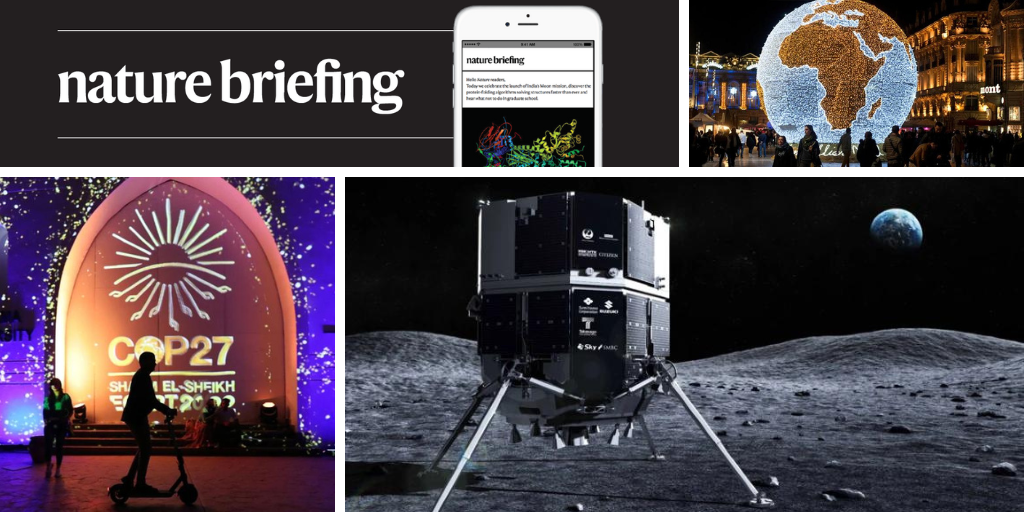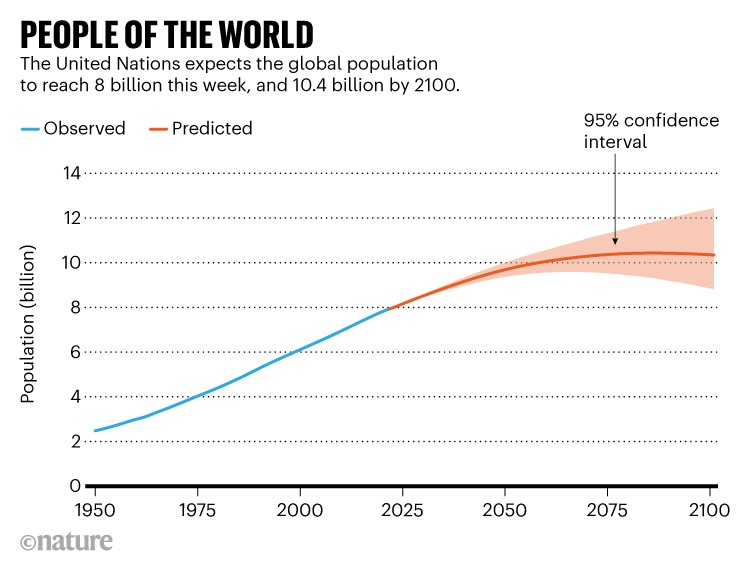Hello Nature readers, would you like to get this Briefing in your inbox free every day? Sign up here
The world’s population hit eight billion on 15 November, according to United Nations estimates.Credit: Jean-Marc Zaorski/Gamma-Rapho/Getty
According to United Nations models, the world’s population will reach eight billion people today — less than a century after the planet supported just two billion.
• Rapid growth has been driven by advances in public health and medicine, which have allowed more children to survive to adulthood. At the same time, fertility rates stayed high in lower-income countries.
• But growth is slowing, and, within a few decades, Earth’s population will begin to shrink. Today, almost half the people on Earth live in places where lifetime fertility is below 2.1 births per woman — roughly the level required for populations with low mortality to stop growing in the long run.
• Most of the projected increase in the global population between 2022 and 2050 is expected to occur in just eight countries: the Democratic Republic of the Congo, Egypt, Ethiopia, India, Nigeria, Pakistan, the Philippines and Tanzania.
• India is projected to surpass China as the world’s most populous country in 2023.
Reference: UN Population Division Data Portal
Source: UN Population DivisionSource: UN Population Division
A Moon lander made by a Japanese company is aiming to be the first of several private ventures to land on the lunar surface next year. ispace’s M1 lander will carry the United Arab Emirates’ first Moon rover and payloads for the Japanese Space Agency, JAXA, and will launch on a SpaceX rocket. The craft will take a circuitous route to prioritize payload over fuel — which means that it could be overtaken by other commercial missions launching in 2023. At least two landers supported by NASA’s Commercial Lunar Payload Services programme will launch early next year and take a more direct route. “It’s going to be a race,” says lunar-exploration specialist Abigail Calzada Diaz. “It’s going to be really fun to watch.”
NASA has confirmed the discovery of large wreckage from the space shuttle Challenger at the bottom of the Atlantic ocean, off the coast of Florida in the United States. The shuttle broke up soon after taking off in January 1986 because of erosion in the seals in the solid rocket booster. All seven astronauts on board were killed. Divers looking for a plane from the Second World War as part of a TV documentary spotted the debris, and NASA verified it through video footage.
Features & opinion
As the FIFA tournament kicks off, researchers are showing their skills to help soccer coaches develop players and tactics. Data analysis now helps to steer everything from player transfers and the intensity of training, to targeting opponents and recommending the best direction to kick the ball at any point on the pitch. Meanwhile, footballers face the kind of data scrutiny more often associated with an astronaut.
Today is my first full day at COP27 in Egypt, and as I write this I’m wearing a scarf in a freezing climate-controlled conference centre when it’s a balmy 23 ℃ outside. It’s a tiny irony in a place where there is often a gulf between words and deeds. For several days, you have been writing to tell me what you would like to hear from this conference, and I hope you will keep it up. Your feedback is always welcome at [email protected].
Thanks for reading,
Flora Graham, senior editor, Nature Briefing
With contributions by Smriti Mallapaty
We’ve recently launched two new e-mails you might like. They’re free, and of course you can unsubscribe at any time.
• Nature Briefing: Cancer Research — a new weekly newsletter written with cancer researchers in mind. Sign up here to receive the next one.
• Nature Briefing: Translational Research covers biotechnology, drug discovery and pharma. Sign up here to get it free in your inbox each week.









More News
Daily briefing: Why exercise is good for us
Daily briefing: Orangutan is first wild animal seen using medicinal plant
Old electric-vehicle batteries can find new purpose — on the grid